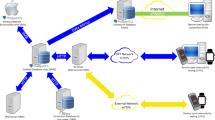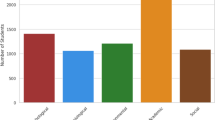Abstract
The severe or prolonged exposure to stress-inducing factors in occupational and academic settings is a growing concern. The literature describes several potentially stressful moments experienced by medical students throughout the course, affecting cognitive functioning and learning. In this paper, we introduce the EUSTRESS Solution, that aims to create an Information System to monitor and assess, continuously and in real-time, the stress levels of the individuals in order to predict chronic stress. The Information System will use a measuring instrument based on wearable devices and machine learning techniques to collect and process stress-related data from the individual without his/her explicit interaction. A big database has been built through physiological, psychological, and behavioral assessments of medical students. In this paper, we focus on heart rate and heart rate variability indices, by comparing baseline and stress condition. In order to develop a predictive model of stress, we performed different statistical tests. Preliminary results showed the neural network had the better model fit. As future work, we will integrate salivary samples and self-report questionnaires in order to develop a more complex and intelligent model.
Access this chapter
Tax calculation will be finalised at checkout
Purchases are for personal use only
Similar content being viewed by others
References
AON. https://www.aon.com/getmedia/2626c505-cd46-4d01-9703-0ff5f30c118e/aon-emea-health-survey-2018-en.pdf.aspx. Accessed 5 Dec 2018
Stansfeld, S., Fuhrer, R., Shipley, M., Marmot, M.: Work characteristics predict psychiatric disorder: prospective results from the Whitehall study. J. Occup. Environ. Med. 56, 302–307 (1999)
Hicks, T., McSherry, C.: A Guide to Managing Workplace Stress. Universal Publishers, California (2006)
Weiss, T.W.: Workplace stress: symptoms and solution. http://www.disabled-world.com/disability/types/psychological/workplacestress.php. Accessed 12 Dec 2018
Massida, D., Giorgi, I., Vidotto, G., Tringali, S., Imbriani, M., Baiardi, P., Bertolotti, G.: The Maugeri stress index - reduced form: a questionnaire for job stress assessment. Neuropsychiatr. Dis. Treat. 13, 917–926 (2017)
Oksman, V., Ermes, M., Katu, T.: Eustress – findings concerning the indication and interpretation of positive stress among entrepreneurs – a case study. Bus. Manag. Rev. 7(3), 342–347 (2016)
Cohen, S., Kamarck, T., Mermelstein, R.: A global measure of perceived stress. J. Health Soc. Behav. 24(4), 358–396 (1983)
Bong, K., Park, J.K., Kim, C.H., Cho, S.: Development of the stress response inventory and its application in clinical practice. Psychosom. Med. 63, 668–678 (2001)
Alberdi, A., Aztiria, A., Basarab, A.: Towards an automatic early stress recognition system for office environments based on multimodal measurements: a review. J. Biomed. Inf. 59, 49–75 (2016)
Berntson, G., Cacioppo, J.T.: Heart rate variability – stress and psychiatric conditions. In: Dynamic Electrocardiography, pp. 56–63. Wiley, New Jersey (2007)
Shaffer, F., Ginsberg, J.: An overview of heart rate variability metrics and norms. Front. Public Health 5, 1–17 (2017)
Taelman, J., Vandeput, S., Spaepen, A., Van Huffel, S.: Influence of mental stress on heart rate and heart rate variability. In: ECIFMBE 2008 Proceedings, vol. 22, pp. 1366–1369. Springer (2008)
Santos, F.S., Maia, C.R.C., Faedo, F.C., Gomes, G.P.C., Nunes, M.E., Oliveira, M.V.M.: Stress among Pre-University and Undergraduate Medical Students. Rev. Bras. Educ. Med. 41(2), 194–200 (2017)
Jackson, E., Shanafelt, T., Hasan, O., Satele, D., Dyrbye, L.: Burnout and alcohol abuse/dependence among U.S. medical students. Acad. Med. https://doi.org/10.1097/acm.0000000000001138 (2016)
Soares, J., Sampaio, A., Ferreira, L., Santos, N., Marques, F., Palha, J., Cerqueira, J., Sousa, N.: Stress-induced changes in human decision-making are reversible. Transl. Psychiatry 2, e131 (2012). https://doi.org/10.1038/tp.2012.59
Soares, J., Sampaio, A., Marques, P., Ferreira, L., Santos, N., Marques, F., Palha, J., Cerqueira, J., Sousa, N.: Plasticity of resting state brain networks in recovery from stress. Front. Hum. Neurosci. 7, 919–929 (2013)
González-Cabrera, J., Fernández-Prada, M., Iribar-Ibabe, C., Peinado, J.: M: Acute and chronic stress increase salivary cortisol: a study in the real-life setting of a national examination undertaken by medical graduates. Stress 17(2), 149–156 (2014)
Kurokawa, K., Tanahashi, T., Murata, A., Akaike, Y., Katsuura, S., Nishida, K., Masuda, K., Kuwano, Y., Kawai, T., Rokutan, K.: Effects of chronic academic stress on mental state and expression of glucocorticoid receptor α and β isoforms in healthy Japanese medical students. Stress 14(4), 431–438 (2011)
Blasche, G., Zilic, J., Frischenschlager, O.: Task-related increases in fatigue predict recovery time after academic stress. J. Occup. Health 58, 89–95 (2016)
Nogueira, P., et al.: A review of commercial and medical-grade physiological monitoring devices for Biofeedback assisted quality of life improvement studies. J. Med. Syst. 42(6), 275–285 (2017)
Trigo, M., Canudo, N., Branco, F., Silva, D.: Study of the psychometric properties of the Perceived Stress Scale (PSS) in the Portuguese population. Psychologica 53, 353–378 (2010)
Ribeiro, J.L., Rodrigues, A.P.: Some questions about coping: the study of the Portuguese adaptation of the Brief COPE. Psicolog. Saúde Doenças 5(1), 3–15 (2004)
Acknowledgements
This work was funded by projects: the EUSTRESS (Sistema de Informação para a Monitorização e Avaliação dos Níveis do Stress e Previsão de Stress Crónico”), funded by European Regional Development Fund and by National Funds through the Portuguese Foundation for Science and Technology, within NUP = NORTE-01-0247-FEDER-017832; and the QVida+ project (Estimação Contínua de Qualidade de Vida para Auxílio Eficaz à Decisão Clínica), funded by European Structural funds (FEDER-003446), supported by Norte Portugal Regional Operational Programme (NORTE 2020), under the PORTUGAL 2020 Partnership Agreement.
Author information
Authors and Affiliations
Corresponding author
Editor information
Editors and Affiliations
Rights and permissions
Copyright information
© 2019 Springer Nature Switzerland AG
About this paper
Cite this paper
Silva, E., Aguiar, J., Reis, L.P., Oliveira e Sá, J., Gonçalves, J., Carvalho, V. (2019). Information System for Monitoring and Assessing Stress Among Medical Students. In: Rocha, Á., Adeli, H., Reis, L., Costanzo, S. (eds) New Knowledge in Information Systems and Technologies. WorldCIST'19 2019. Advances in Intelligent Systems and Computing, vol 931. Springer, Cham. https://doi.org/10.1007/978-3-030-16184-2_56
Download citation
DOI: https://doi.org/10.1007/978-3-030-16184-2_56
Published:
Publisher Name: Springer, Cham
Print ISBN: 978-3-030-16183-5
Online ISBN: 978-3-030-16184-2
eBook Packages: Intelligent Technologies and RoboticsIntelligent Technologies and Robotics (R0)




